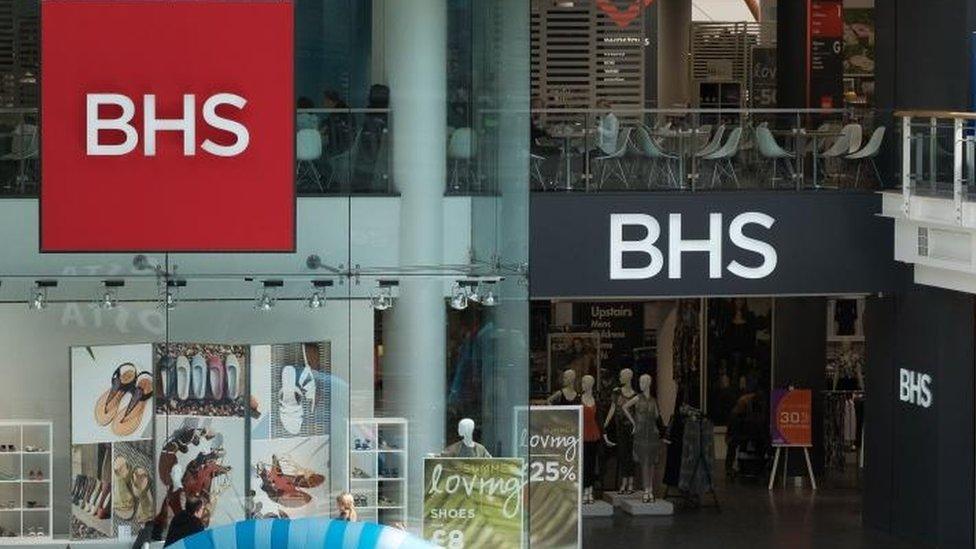Pension scheme at heart of BHS woes
- Published

Many analysts argue the writing has been on the wall for retailer BHS for some time - and much the same could be said for the pension scheme.
The failure of the retail chain and the hole in its pension are inextricably linked but, for members of the two BHS pension schemes, the practical effects are already being felt by those who were in the company's final-salary schemes.
Since early March, the schemes have been assessed for entry into the Pension Protection Fund, external (PPF) - the lifeboat for pensions that ensures people are paid their pension even when a company goes bust.
Consequently, those who are preparing to receive their BHS pension from the age of 60 will get at least 10% less than they would originally have expected.
Now, at the point of administration, the link between the company and the pension scheme is severed, with pension scheme members now relying on the PPF.

What is the problem with the pension?
There is a £571m hole - or deficit - in the BHS pension. This is far bigger than the scheme's assets. The potential of taking on such a burden may be one of the reasons that BHS has failed to find backers or buyers for the business at a whole.
The final-salary scheme was closed seven years ago. That means contributions could no longer be paid. Fewer than one in 10 current members of staff were in this scheme.
Over the years 20,462 people - past and present staff - have paid in to these pension schemes, according to the latest data.
They received a letter at the start of March, from the scheme's trustees, telling them that the process of entering the PPF was underway.
"The Trustees very much regret that it has not been possible to find a long-term funding solution for the scheme," the letter said.
News of BHS entering administration suggests that any last chance of the pension deficit being bought, along with the company as a whole, has disappeared.

How does the PPF work?
It has been set up to pay compensation to those with defined benefit, or final-salary, pension schemes when the employer goes bust and there is insufficient assets in the pension scheme to cover the cost of paying these pensions.
To pay for this, compulsory annual levies are charged on all schemes that would be eligible to enter the PPF if needed.
The size of the BHS pension scheme means it will easily be in the top 10 of biggest rescues by the PPF.
In practical terms, it has been suggested that the bill facing the PPF is estimated to be about £250m because the PPF will not pay out in full.

How much pension will members be paid?
The age at which final-salary scheme savers can start drawing their BHS pension is 60.
Generally, any member who was aged 60 or over before 3 March (when the assessment period began), their pension will be paid in full. A total of 6,774 pensioners are in this bracket, according to the latest data. Some of those who retired early owing to ill-health, or spouses also fall into this bracket.
The remainder who most have yet to draw their pension. This includes 851 who were still working at BHS, and 12,837 who have left.
They will receive 90% of what they might have expected, so they will take a 10% cut. A cap in payments may also be set.
For all these current and future pensioners, the amount by which the pension is increased each year, to take account of the rising cost of living, will generally rise in line with the Consumer Prices Index measure of inflation - up to a maximum of 2.5%.
That will end up being less than they had expected under the scheme, particularly if inflation rises from its current low levels in the coming year.
The vast majority of current staff, if they save in the company's pension, are in a money purchase scheme, so their savings will be put in a pot to use at retirement - as would always have been the case.

What happens next?
The assessment period from the PPF can take a long time. Advisers go through the books to ensure all the information the scheme holds is accurate and up to date.
The PPF will then decide whether to take on the scheme but, in the meantime, the scheme acts as if it is under the PPF umbrella.
There is the opportunity for the Pensions Regulator to take action if it found that an employer deliberately attempted to avoid their pension obligations, leaving the PPF to pick up their pension liabilities.
The regulator confirmed that an investigation was taking place.
"Such cases are complex. There is a clear process that must be followed and this can sometimes take a considerable amount of time," a spokesman for the regulator said.